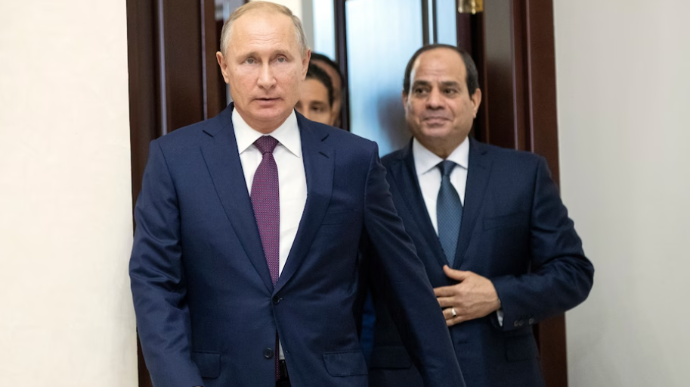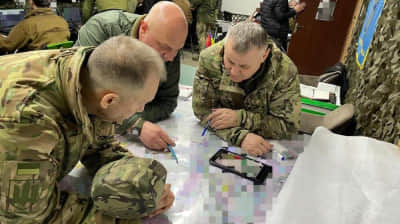Egypt secretly planned to supply rockets to Russia

Leaked US intelligence documents indicate that Egyptian President Abdel Fattah El-Sisi planned to produce 40,000 rockets for Russia in February and instructed officials to keep the production and shipment of rockets secret "to avoid problems with the West".
Source: The Washington Post
Details: The president of Egypt, one of America’s closest allies in the Middle East and a major recipient of US aid, recently ordered subordinates to produce up to 40,000 rockets to be covertly shipped to Russia, according to a leaked US intelligence document.
The Washington Post reported that a portion of a top secret document, dated 17 February, sums up purported conversations between Sisi and senior Egyptian military officials and references plans to supply Russia with artillery rounds and gunpowder. In the document, Sisi instructs the officials to keep the production and shipment of the rockets secret "to avoid problems with the West".
The Washington Post obtained the document from a trove of images of classified files posted in February and March on Discord, a chat app popular with gamers. The document has not been previously reported.
A US government official, speaking on the condition of anonymity to address sensitive information, said that "We are not aware of any execution of that plan," referring to the rocket export initiative. "We have not seen that [delivery of missiles from Egypt to the Russian Federation – ed.] happen," the official added.
The Washington Post emphasised that "providing arms to Russia for its war in Ukraine would represent a potentially explosive gambit for Egypt, a nation that, despite deepening ties with Moscow, remains deeply invested in its partnership with the United States, which for decades has provided the country more than $1 billion a year in security aid".
The document does not explicitly state why Russia is interested in acquiring the rockets, but its military has been expending huge amounts of ammunition in the war, and the US government has claimed that North Korea is covertly supplying Russia with artillery rounds and that China is considering doing the same.
Senator Chris Murphy, who serves on the Senate Foreign Relations and Appropriations committees, said that "Egypt is one of our oldest allies in the Middle East," so "if it's true that Sisi is covertly building rockets for Russia that could be used in Ukraine, we need to have a serious reckoning about the state of our relationship".
Sarah Margon, director of US foreign policy at the Open Society Foundations and the Biden administration’s onetime nominee for the State Department's top human rights post, said that "an intentional sale and delivery of rockets to the Russian government, which has committed such explicit war and other atrocity crimes, is just beyond the pale, especially for an ostensibly close U.S. ally".
As The Washington Post noted that the document describes Sisi issuing instructions on 1 February for keeping the supply of rockets secret in order "to avoid problems with ‘the West," telling a person mentioned only as Salah al-Din that factory workers should be told the projectiles are intended for the Egyptian army.
Salah al-Din, as The Washington Post supposed, is probably Mohamed Salah al-Din, the minister of state for military production.
The gunpowder offered to Russia, which is mentioned in the document, would come from Factory 18, the name of a chemical manufacturing plant that has existed for several decades, the newspaper writes.
The document quotes Salah al-Din as saying he would "order his people to work shift work if necessary because it was the least Egypt could do to repay Russia for unspecified help earlier". The leaked document also quotes Salah al-Din as saying the Russians told him they were willing to "buy anything". The document does not make it clear what the earlier Russian assistance was, The Washington Post noted.
As The Washington Post said, in the document, the president of Egypt is quoted as saying that he was considering selling "ordinary stuff" to China to make room for "more Sakr 45 production," a reference to a type of 122mm rocket manufactured by Egypt.
The document does not explicitly say whether the rockets that would be produced for Russia were Sakr 45s, but such rockets would be compatible with Russian Grad multiple rocket launchers.
"While the document does not state how the U.S. government gleaned the details of the Egyptian deliberations, some of the information in the recently leaked documents appears to come from signals intelligence, which refers to technical means such as communications intercepts. The U.S. government has long had a vast eavesdropping capability and a history of intercepting communication from foreign leaders," The Washington Post said.
The 1 February conversation involving Sisi would have occurred just days after the US Secretary of State Antony Blinken met with Egypt’s president during a visit to Cairo. Immediately after Blinken’s visit, Egyptian Foreign Minister Sameh Shoukry travelled to Moscow for talks with Russian leaders.
Background:
- The US Department of Defence is still assessing the scale of the leak of classified information in recent weeks, which, in particular, contained information about the combat capability of the Ukrainian Armed Forces and the actions of American allies.
- The US State Department claims that the incident with the leakage of secret documents of the US Department of Defence will not affect the support of Ukraine in its war with Russia.
- Previously, in the US Department of Justice, an investigation has been launched into the leak of many documents that American intelligence agencies have posted on social media in recent weeks.
- The President’s Administration has not yet discovered who is behind the leak of secret military documents.
Journalists fight on their own frontline. Support Ukrainska Pravda or become our patron!





